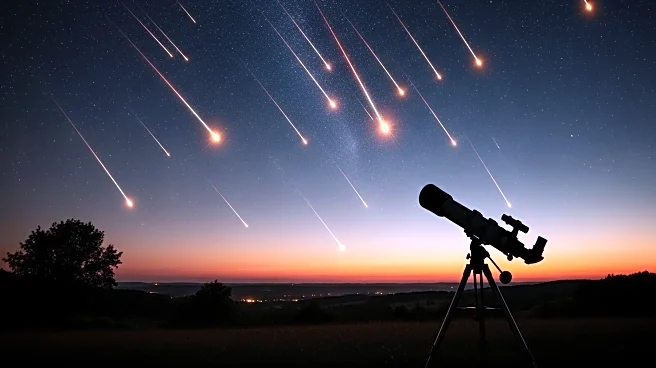What's Happening?
Asteroid 2023 CX1 was observed disintegrating over northwestern France on February 13, 2023. The asteroid, initially spotted by a Hungarian astronomer, was less than a meter wide and weighed 650 kilos. Scientists from NASA and the European Space Agency calculated its descent with precision, aided by observatories worldwide. The FRIPON/Vigie-Ciel network in France mobilized professional and amateur astronomers to collect meteorites from the asteroid's fragments. The first meteorite was found two days later, weighing 93 grams, in Saint-Pierre-le-Viger. In total, around a dozen meteorites were collected, contributing to a study published in Nature Astronomy. The asteroid likely originated from the Massalia asteroid family between Mars and Jupiter. Its disintegration released significant energy, losing 98% of its mass.
Why It's Important?
The study of Asteroid 2023 CX1's disintegration provides valuable insights into the behavior of space rocks entering Earth's atmosphere. Understanding the fragmentation process can help predict potential damage from future asteroid impacts. The collaboration between scientists and amateur astronomers highlights the importance of public engagement in scientific research. The findings contribute to the limited data on asteroids detected before impact, enhancing knowledge of their trajectories and fragmentation patterns. This research may inform future strategies for asteroid impact prevention and mitigation, potentially safeguarding communities from similar events.
What's Next?
Further analysis of the collected meteorites will continue, potentially revealing more about the asteroid's composition and origin. Scientists may use this data to refine models predicting asteroid behavior upon entering Earth's atmosphere. The study's findings could influence future asteroid tracking and impact prevention efforts, encouraging international collaboration among space agencies and observatories. Public engagement in scientific research may be further promoted, leveraging social media and community networks to enhance data collection and analysis.
Beyond the Headlines
The study raises questions about the potential for more destructive asteroid impacts, emphasizing the need for improved detection and tracking systems. Ethical considerations may arise regarding the allocation of resources for asteroid impact prevention versus other scientific endeavors. The collaboration between scientists and the public demonstrates a shift towards more inclusive and participatory scientific research, potentially influencing future approaches to data collection and analysis.










